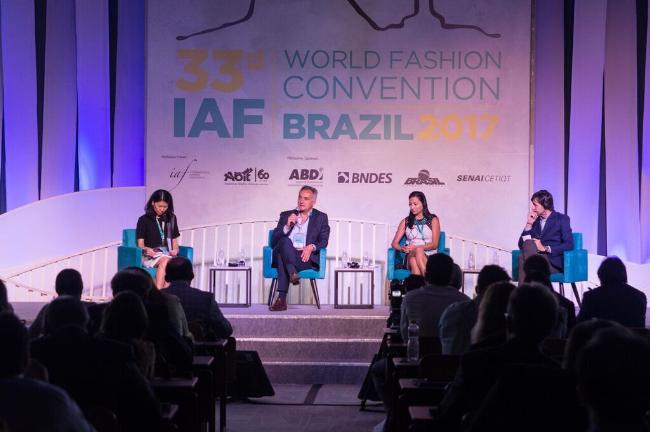Brands unite to implement compliance among suppliers

The first panel during IAF’S Convention was held on Tuesday, 17, gathering large national and international retail and industry brands to discuss how they have been committed to compliance and how they have worked with their suppliers. Moderated by DuPont’s Marketing Manager, Mrs. Katia Hamada, the debate focused on the issue of how the Retail sector might collaborate and not just put pressure on suppliers in regard to sustainability rules.
For Mr. Fábio Hering, Hering’s CEO, sustainability initiatives should not initially project profits or increase the value of a brand, but avoid value loss, since consumers and investors require that we follow and implement market trends.
Hering is a century-old industry that also migrated to the retail sector in the 1990’s, it owns nowadays more than 740 stores, and is considered the largest apparel franchise in Brazil. Hering still makes a part of its products, but a greater part of the production is undertaken by partners, and the majority of it here in Brazil. Around 25% of the production is made in Asia. “In order to go from a model where we produced 100% of our products to a hybrid model, we had to create a team of experts not to audit, but to qualify and cooperate with suppliers,” explained Mr. Fábio Hering. Also according to that CEO, Hering expanded its production to different states, especially in small cities, where producers were trained. Today, Hering claims to be responsible for generating approximately 5 thousand jobs and to have kept those people in their original cities. “If we add direct and indirect collaborators, our company generates 15 thousand jobs”
What large brands say
Mrs. Marissa Pagnani MacGowan, Vice-President of Corporate Responsibility at the PVH Corp Group, which gathers large international brands (Tommy Hilfiger, Calvin Klein, Heritage Brands) talked about the great effort the Group has made to get out of the firing line of many different groups promoting different causes (from human rights to employee wages, including gender differences), while striving not only to defend the business, but trying to eliminate the core of problems. “As in the case of Hering in Brazil, it is not enough to put pressure on partners, but to help them overcome the problem, whether it is a labor, ethical or environmental one,” said Mrs. Marissa. “There are 237 NGOs that usually call us questioning just about everything. That is why we have to know where, how, who and under what conditions all our products are produced.” According to that businesswoman from PVH, “the process to know all the impacts should start inside the very company. That is, the Board of Directors and designers have to analyze how they work, create, demand and establish goals inside the company, before requiring partners not to do this or that. Our group sells items to 1 million clients and operates in 58 countries. We can make a difference.”
The global partner engagement leader at C&A, Mr. Aleix Busquet, goes beyond that and puts on the table the discussion about wages. “We have to talk about that. We know that there still is a lot of informality at work, in all of the 10 countries that produce today 80% of everything the world wears. And we know there are minimal, very low wages,” claimed Mr. Busquet.
C&A owns more than 2 thousand stores, it is 176 years old, and has been a family-owned company for many generations. It currently has 60 thousand employees and operates in 21 countries, trading with 100 million clients and 1 million suppliers. Brazil makes 16% of their production.
“When we talk about suppliers, we mean exposition of million tons of trash and the use of million liters of water. To make a T-shirt it is necessary to use 7,200 liters of water. We have to help our partners to adopt the best practices, because they have an impact on sustainability.”
As regards the wage issue, Mr. Busquet stressed that it is necessary to establish a minimum wage for those workers, according to the reality in every Country, but 20 large companies have united this year and entered into an agreement to discus issues with workers’ representatives and companies operating in those countries to start a dialogue about wages. “We know that we too must change. Practices such as requesting last minute alterations has a very significant impact on those partners and we have to change that. Compliance simply means the Law. But before punishing anyone, wee need to collaborate,” he concluded.
abit, IAF, IAF Brasil